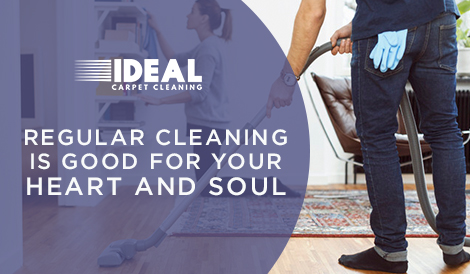
A clean house isn’t just “nice to have,” it’s actually a necessity for good mental and physical health. According to a study published in Time, the Indiana University department of Physical Activity, led by associate professor Nicole Keith, discovered a correlation between clean houses and healthy people.
Researchers tracked the physical health of 998 African Americans between the ages of 49 and 65 — a demographic with a high-risk for heart disease – by comparing their levels of physical activity with the cleanliness of their homes. Those people with the cleanest homes were also the healthiest and most active, according to the study results. In fact, the findings also suggested that encouraging people to maintain their home’s cleanliness may be even more important to their overall health than the walkability of the neighborhood they live in.
“At the end of the day, the interior condition of their house seemed to be the only thing affecting their physical activity,” said Keith. “It was not at all what we expected.”
It’s clear by Keith’s statement that their discovery surprised even the researchers, but are these findings really so shocking? Florence Nightingale, a pioneer of modern nursing, famously quoted, “The connection between health and the dwelling of the population is one of the most important that exists.”
Even the Environmental Protection Agency admits that indoor air can be up to five times more polluted than the outdoors. If the average person spends up to 90 percent of their time indoors, we are breathing in dust mites, pet dander, pollen, mold, bug skeletons, and toxins from such innocuous sources as conventional cleaning products and even chemicals emitted from our own clothing and bedding. These toxins manifest themselves as symptoms most people attribute to allergies such as itchy eyes, runny nose, and wheezing, but which should actually be blamed on an unclean house.
And the germy culprits aren’t always where you think they are. Elizabeth Scott, PhD, co-director of the Center for Hygiene and Health in Home and Community at Simmons College in Boston, found staphylococcus bacteria, a common cause of serious skin infections, in 26 percent of the tubs she tested, compared with just 6 percent of garbage cans.
Yes, these statistics provide scientific proof that the mental and health benefits of a clean environment are very real; but, we also look to the renewed energy and happiness our clients describe to us after one of our visits. When we hear our clients use words such as “therapeutic,” “relaxing,” and “motivating” to describe their newly cleaned homes and offices we are reminded that a clean home is truly the embodiment of the science and soul holistic cleaning philosophy we maintain at GreenHouse Eco-Cleaning.
Original article by Saudi Davis can be found on The Huffington Post.